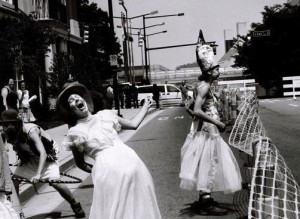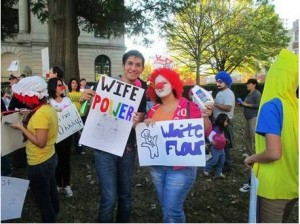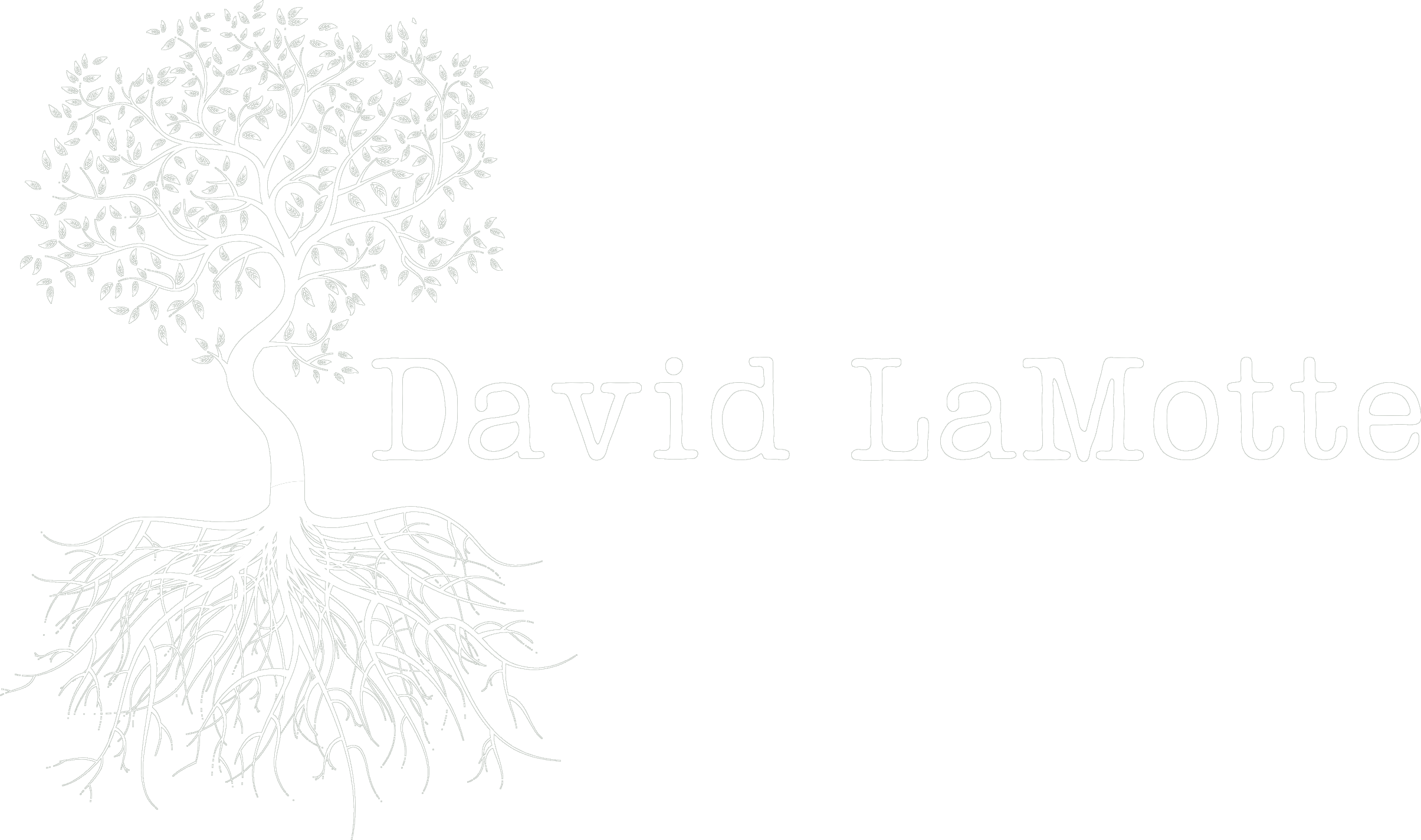This Saturday the Ku Klux Klan is promising to have one of its largest rallies ever in Memphis, Tennessee. I’m headed there too.
The Memphis park formerly known as Forrest Park, after Civil War general, slave trader and first Grand Wizard of the KKK Nathan Bedford Forrest, now bears the innocuous moniker “Health Sciences Park” instead. A bill making its way through the Tennessee legislature would prevent Tennessee towns from changing the names of public spaces that are named after war heroes, including Civil War heroes, and Memphis decided to take preemptive action. Unsurprisingly, the Klan is not too happy with that move.
In the past nine months I have found myself becoming much more familiar with the KKK due to a children’s book I wrote called White Flour. The illustrated book and the poem that provides its text tell the story of a rally in Knoxville, Tennessee, where a group of Klansmen and neo-Nazis were met by a troupe of counter-protesters called the Coup Clutz Clowns, who met hatred with humor—and won.
The clowns had prepared carefully for the rally, and when the Klan screamed “white power,” the clowns seemed to mishear, joining in enthusiastically with chants of “white flour!” and having a big flour fight. Later, they decided that they might have heard wrong, and that the klansmen must be having a rally for ‘white flowers,’ which they joyfully passed out, and then for ‘tight showers’, which they acted out, crowding beneath a camp shower they had brought, and then ‘wife power,’ pulling on wedding dresses and dancing.

This really happened. It was on May 26, 2007, and I’ve talked to quite a few people who were there that day in my research the book. One of the clowns was at a concert I did in Santa Cruz a couple of weeks ago (my day job is as a performing songwriter). Their creative engagement inspired me deeply, and the story rocked me because it not only illustrates important ideas about nonviolence, but it’s funny, and that makes it accessible. So I wrote a poem, and the poem became a book, and the book has sort of taken over my life since May when it came out, on the five-year anniversary of the event that inspired it. The White Flour poem has inspired other clown protests since, including one in Charlotte, NC in 2012, which is written up in the current issue of the Southern Poverty Law Center‘s publication Intelligence Report and recommended in their magazine Teaching Tolerance. People have written lesson plans for public schools and Sunday schools about the book. Stories matter, and ripples go on.
One of the things that this story illustrates so well is that there are more than two available responses to aggression. Fight and flight come quite naturally to us, but often the best response is neither of those. Nonviolence demands creativity—that we think beyond those options to what Walter Wink called a “third way.” It may not always demand clown makeup, but it always calls for us to move beyond the options of simply rolling over, which leads to impunity for the aggressors, or fighting hatred and violence with hatred and violence, which, as Dr. King famously said, adds “deeper darkness to a night already devoid of stars.”
This is often misunderstood. Peace is not placidity, and peacemaking has nothing to do with inaction. In questioning the wisdom of the Iraq war a dozen years ago, I was often confronted with statements like “Well you can’t just do nothing!”, as though that were the only other alternative. Peacemaking is not passive. It is about engaging conflict in ways that are constructive rather than destructive. Note the verb there: engaging.

As this rally has become the subject of more and more media attention in recent weeks, some have made the reasonable argument that we should just ignore the rally. It’s true that this can be an excellent strategy when it is well organized and intentional. The town of Davidson, North Carolina did this beautifully in 1986 when the Klan held a rally there. They arranged to close every single shop downtown and the students of Davidson college organized a day of food and fun on campus, far from the downtown rally. A few cameras were hidden in trees, but the Klan had no human audience to entertain. Brilliant.
That strategy won’t be effective with this rally, though. It has already received enough press that we know people are coming from all over. And a diverse crowd they are, including nonviolent community activists as well as many who don’t share that commitment to nonviolence. Memphis gangs have promised to be out in force. There are even skinheads and Klansmen from other branches of the KKK who are coming to protest the Klan rally. No kidding.
People are going to be there to respond, so the question becomes ‘respond how?’ Clearly, there will be various approaches on display. I’m not at all confident that we will get through the day without violence, and it may be serious. Still, I think there’s something to be said for showing up and doing the best we can to stand in the way of hatred and stand firmly for love. That’s what I’ll be trying to stand for. Messy, courageous, defiant, imperfect, laughing love.
Sometimes we need to do that—stand up and be clear regarding what we stand for, and even, as Quakers say, “stand in the way” of what we think is misguided. If we don’t offer solidarity and alternative perspectives when voices of hatred are raised, then the targets of that hatred feel abandoned—because they are.
The question I wrestle with most in these kinds of conflicts is how to stand firmly in ways that make space for growth and transformation, rather than simply fueling hatred that is already burning out of control. I have found that humor, music and art can be powerful tools in that effort. Gene Sharp has documented this beautifully if you want to know more.
In the long run, though, the best strategy for countering bigotry is to build community that is strong enough to withstand it. That’s what I’ll be working on for most of Saturday. Not engaging the Klan, but connecting with and learning from Memphis activists at a big event sponsored by Memphis Unite called the People’s Conference on Race and Equality. This is the most important work we can do—exploring and experimenting together regarding how we build community, build knowledge, build understanding and build each other up for a long struggle that is much less dramatic, more important and more enduring than a Klan rally.
I’ll be live tweeting all day (@davidlamotte) if you care to read along, sharing news, images and the best things I see and hear. I’ll be flying over early in the morning from North Carolina, where I live. I’ll spend the first part of the day at the Memphis Unite Conference on Race and Equality, speaking on a panel at 11AM, then will probably head over to see how people are approaching the Klan rally. I’m not sure what I’ll see and learn, but I think I know what I want to say. It’s summed up in the last stanza of White Flour:
And what would be the lesson of that shiny Southern day
Can we understand the message that the clowns sought to convey?
Seems that when you’re fighting hatred, hatred’s not the thing to use
So here’s to those who march on in their big red floppy shoes

What a wonderful story, all the better because it’s true! Thanks to a friend in Greenville, SC who sent it to me. it will not make the rounds in Boulder, Colorado and beyond.
Thanks much, Jean, and thanks for your work with PFLAG.
Thank you for writing the song and book and going out there to make a difference! Thank you for your ideas on doing something about the crazy injustice we see. I am an elementary school music teacher and was moved to write this song after the tragedy in Newtown. I thought you might like it: http://www.youtube.com/watch?v=e9ixxlIkNNY
Thanks,
Susan Wright
Beacon, NY
Thank *you* Susan. Your song is powerful, and elementary school teachers are on the front lines of social change — there aren’t many jobs I can think of that seem more important than that one.
You might be interested in the common core reading curriculum for White Flour that a friend made. It’s a free pdf download, here: http://www.whiteflourbook.com/teachers/
Peace,
David
Hi Mr. LaMotte – we’ve heard and read about you from our friend Reggie Harris – you sound awesome!! Can’t wait to get your book! We have been very involved with issues of race and African-American history for a long time (since my childhood, really) – we live in Great Barrington, MA, the town where W. E. B. DuBois was born. We have a radio show, which often airs, as I said, issues of historical and social import especially around race. We would love to interview you on our show sometime, if you have time. It could be by phone. Our show airs every Wednesday night from 8 to 10 pm on WBCR-lp, 97.7 FM in and around Great Barrington, and streaming live at http://www.berkshireradio.org. Hope to hear from you! Barbara
Hi Barbara, thanks so much for getting in touch. I’d be delighted to chat with you on your show. Any friend of Reggie’s… 😉 Please drop a note to Emma at booking(at)davidlamotte.com to schedule it, and we’ll go from there. Thanks for doing the work you do.